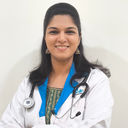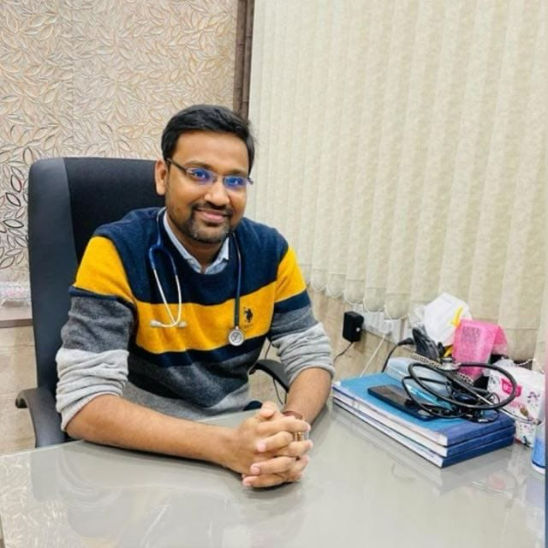Guide to Paediatric
Know about paediatric care, why it's important, and what should child's visits should include. Growth, development, prevention, influence of sleep, daily habits, common illnesses, mental, behavioural health and getting care and more.

Written by Dr. Dhankecha Mayank Dineshbhai
Reviewed by Dr. Rohinipriyanka Pondugula MBBS
Last updated on 13th Jan, 2026

Introduction
Paediatric care isn’t just about treating colds and fevers—it’s the ongoing support that helps children thrive from birth through adolescence. As a parent or caregiver, you’re navigating decisions about vaccinations, nutrition, sleep, development, safety, mental health, and when to see a paediatrician. This guide to paediatric health breaks those big topics into clear, trustworthy, and practical steps. We’ll cover what to expect at each stage, how to recognise common issues, and when to seek help. You’ll also find tips for at-home care, prevention strategies, and how to use digital tools to keep your child’s records organised. Whether you’re caring for a newborn, a toddler learning to talk, a school-age child building healthy habits, or a teen facing new challenges, this paediatric guide gives you the essentials—and the nuance—to make confident choices.
Note: If symptoms persist beyond two weeks, if your child has trouble breathing, severe pain, dehydration, or worsening symptoms, consult a doctor online with Apollo24|7 for further evaluation. For lab tests like vitamin D, iron, or HbA1c, Apollo24|7 offers convenient home collection.
Consult a Top Paediatrician for Personalised Advice
Understanding Paediatric Care Across Childhood
Paediatric care covers preventive, diagnostic, and therapeutic services for children from birth through adolescence. A paediatrician is trained to address age-specific needs—from feeding challenges in infants to mental health and school issues in teens—considering growth, development, and family context. Paediatric subspecialties include neonatology, cardiology, neurology, allergy/immunology, and adolescent medicine, among others (WHO; RCPCH).
Ages and stages matter. Babies and toddlers grow rapidly; regular well-child visits help track growth chart percentiles and developmental milestones. School-age children need immunisations, dental care, sleep hygiene, and injury prevention. Adolescents face unique issues like puberty, mood changes, social pressures, sports injuries, and digital well-being. Across all ages, paediatric care emphasises prevention and early detection—because small issues can quickly grow in children.
What do well-child visits include?
Typically: a physical exam; growth measurements (height/length, weight, head circumference in infants, BMI in older children); developmental screening; vision and hearing checks; vaccine updates; and anticipatory guidance (what to expect before the next visit). Many health systems follow schedules published by professional bodies like the American Academy of Paediatrics and NHS, adapted to local contexts (AAP; NHS).
If you’re unsure whether an issue needs immediate attention, use a simple triage rule: red (urgent), amber (soon), green (watchful waiting). Trouble breathing, blue lips, unresponsiveness, severe dehydration, or a rash with fever are red—seek urgent care. If symptoms persist beyond two weeks or your child’s condition doesn’t improve, consult a doctor online with Apollo24|7 or book a physical visit for further evaluation.
Growth and Development: Your Roadmap by Age
Development happens across several domains: gross motor (rolling, walking), fine motor (grasping, drawing), language (babbling, words), cognitive (problem-solving), and social-emotional (smiling, sharing). While each child is unique, paediatric milestones by age offer signposts. For instance, many infants smile socially by 2 months, sit without support by 6–8 months, and take first steps around 12 months; toddlers may speak 2-word phrases by 24 months, and preschoolers can tell simple stories by 4 years (AAP; CDC). Use milestones as guides, not tests.
Red flags signal the need for evaluation and early intervention—for example: no smiling by 3 months, not babbling by 9 months, not walking by 18 months, loss of skills (regression), persistent lack of eye contact, or no single words by 16 months. Early identification matters; timely speech therapy, occupational therapy, or ABA supports can improve outcomes in conditions like autism or developmental language disorder (CDC; NICE). If you notice delays, don’t wait—book a visit, and bring a brief note of what you observe.
Growth tracking uses standardised charts to plot measurements across percentiles. A single percentile isn’t “good” or “bad”—what matters is the trend. A healthy trajectory follows an individual curve; sudden crossing of two percentile lines downwards (e.g., 50th to below 10th) can indicate nutritional or medical issues. Paediatric growth chart percentiles are tools for discussion—if in doubt, ask your paediatrician to explain the pattern and plan.
Prevention First: Vaccines, Screenings, and Safety
Vaccines are one of the most effective paediatric interventions—global immunisation prevents 4–5 million deaths annually by protecting against diseases like measles, polio, and diphtheria (WHO; UNICEF). Paediatric vaccination schedules differ by country but commonly include: BCG (in some regions), Hepatitis B, DTP, Hib, polio, pneumococcal, rotavirus, MMR, varicella, and annual influenza; HPV is recommended in preteens/teens to prevent cancers (CDC; WHO). Keep a digital and physical record; missing a dose typically means catch-up, not restarting.
Screenings detect issues early. Depending on age and risk:
- Newborn: hearing screen, metabolic screens (per country), congenital heart screening.
- Infants/young children: vision and hearing checks, lead (where relevant), anaemia (e.g., at 12 months for risk groups),
dental caries assessment, and growth monitoring. - Adolescents: mental health, scoliosis checks, sexual health counselling, and sports clearance (NHS; AAP; NICE).
- Consider vitamin D or iron tests if your child is at risk for deficiency (limited sunlight, restricted diet, heavy periods in
teens). Apollo24|7 offers home sample collection for labs like vitamin D and HbA1c, which can be convenient for busy
families.
Safety essentials reduce preventable injuries:
- Safe sleep: back to sleep, firm mattress, no pillows/blankets in crib, smoke-free environment (AAP).
- Car seats: rear-facing as long as possible, then forward-facing, then booster; check local laws.
- Home-proofing: secure furniture, use stair gates, store medicines/chemicals locked and high, set water heaters to safe
temperatures, and supervise around water. - Sun and sports: sunscreen, helmets, and heat safety.
Common Paediatric Illnesses and What to Do
Fever is a symptom, not a disease. In children, a fever often accompanies viral infections. Key points:
- For infants under 3 months with a temperature ≥38°C (100.4°F), seek urgent medical advice (AAP; NHS).
- For older children, focus on how the child looks and behaves: hydration, breathing, alertness.
- Use weight-based dosing of paracetamol/acetaminophen or ibuprofen unless contraindicated; avoid aspirin in children.
Always follow label instructions or your paediatrician’s guidance. - If the fever lasts more than 3 days, or your child looks very unwell (lethargic, breathing fast, stiff neck, rash with fever),
seek care promptly. If your condition does not improve after trying these methods, book a physical visit to a doctor with
Apollo24|7.
Coughs and colds are common. Most are viral and resolve with fluids, rest, saline nose drops, and humidified air. Honey (for children over 1 year) can soothe nighttime cough. Avoid over-the-counter cough/cold medicines in young
children unless advised by a clinician (AAP).
Diarrhoea and vomiting increase risk of dehydration. The cornerstone is oral rehydration solution (ORS)—small, frequent sips; continue feeding (breastmilk/formula) alongside ORS. Warning signs include dry mouth, no tears,
decreased urination, sunken eyes, lethargy. If blood is present in stool, there’s persistent vomiting, or signs of dehydration, seek care. Long-tail keyword: oral rehydration solution for kids.
Asthma, allergies, and eczema are common. Work with your clinician on an asthma action plan to manage triggers and recognise early symptoms (wheeze, night cough, activity limitation). Inhaled corticosteroids may be used for persistent asthma; correct spacer technique matters (CDC; AAP). Allergies and eczema benefit from trigger identification, regular moisturising, and sometimes antihistamines or topical steroids as directed.
Food, Sleep, and Movement: Building Healthy Habits
Infant feeding: Exclusive breastfeeding for about the first 6 months is recommended, with continued breastfeeding alongside complementary foods thereafter; iron-rich foods are important when solids begin (WHO). If breastfeeding isn’t possible, iron-fortified infant formula is an appropriate alternative. Introduce allergenic foods (e.g., peanut, egg) around 6 months, after safe textures are established, to reduce allergy risk—discuss with your paediatrician, especially if your child has severe eczema or known egg allergy (AAP). Long-tail keyword: paediatric nutrition recommendations.
Toddlers and school-age children thrive on routine and variety. Offer balanced meals including fruits, vegetables, whole grains, lean proteins, and dairy (or fortified alternatives). For picky eaters, use “division of responsibility”: caregivers decide what, when, and where food is served; children decide whether and how much to eat. Avoid sugary drinks; water and milk are staples. In teens, watch for energy drink use, dieting, or disordered eating signals.
Sleep is foundational. Approximate sleep needs vary by age: toddlers 11–14 hours (including naps), school-age 9–12 hours, teens 8–10 hours. Consistent routines—wind-down time, dim lights, regular schedules—support healthy sleep. Avoid screens at least an hour before bed; blue light delays melatonin and affects sleep quality. Long-tail keyword: screen time recommendations by age.
Movement matters for growth, attention, and mood. Aim for at least 60 minutes per day of moderate to vigorous
physical activity for children and teens, plus age-appropriate muscle and bone-strengthening activities weekly (WHO). For young children, free play and outdoor time are ideal.
Mental and Behavioural Health in Children and Teens
Mental health is health. Anxiety, low mood, attention difficulties, and school stress are common and treatable. Warning
signs include persistent sadness, irritability, withdrawal from friends, sleep problems, dropping grades, or talk of self-
harm. For younger children, watch for excessive tantrums, regression, or changes in play. Early conversations and
supportive routines help; professional evaluation guides next steps (AAP; NHS).
ADHD and autism: Early signs and supports
- ADHD signs can include inattention, hyperactivity, and impulsivity that interfere with functioning across settings (home
and school). Behavioural strategies, classroom accommodations, and sometimes medication form a tailored plan. - Autism spectrum disorder often involves differences in social communication and restricted or repetitive behaviours.
Early signs may include limited eye contact, not responding to name, delayed language, or repetitive movements. Early
intervention—speech therapy, occupational therapy, and parent-mediated strategies—improves outcomes (CDC;
NICE). Long-tail keywords: ADHD signs in children; autism red flags in toddlers.
Building resilience:
- Predictable routines, regular sleep, balanced nutrition, and daily outdoor time support emotional regulation.
- Teach coping skills: name feelings, practice deep breathing, create a “calm corner,” and model healthy screen habits.
- Stay connected with school: ask about learning progress and social dynamics; collaborate on supports if needed.
Getting Care: When to See a Paediatrician and How to Choose
Urgent red flags:
- Difficulty breathing, grunting, blue lips, severe chest retractions
- Severe dehydration (very dry mouth, no urine ≥8 hours, sunken eyes, lethargy)
- Seizure, unresponsiveness, stiff neck with fever, non-blanching rash
- Head injury with loss of consciousness or persistent vomiting
These require urgent care or emergency evaluation (NHS; AAP).
Routine and “soon” appointments:
- Persistent fever >3 days in older children
- Recurrent wheeze or night cough
- Poor weight gain or growth chart percentile drop
- Delayed milestones, learning or behaviour concerns
- Chronic skin rashes or suspected food allergies
- Sleep problems affecting daytime function
If your child’s condition doesn’t improve after home measures, book a physical visit to a doctor with Apollo24|7.
Conclusion
Raising a healthy child is a journey with many small decisions—and you don’t have to make them alone. Paediatric care provides a structured, compassionate framework that adapts from infancy through adolescence. By focusing on prevention—vaccination, screening, safety—and watching development with a steady eye, you’ll catch concerns early and support your child’s unique strengths. When illness strikes, a calm plan for hydration, comfort, and clear red-flag thresholds helps you decide between home care and clinic visits. Just as important are the daily foundations: nutritious meals, steady sleep, active play, and emotional check-ins. They shape health for years to come. Keep records organised, use tele-paediatrics when convenient, and build a trusted relationship with your paediatrician. If symptoms persist beyond two weeks or a concern feels bigger than home care, consult a doctor online with Apollo24|7 or book a physical appointment. With informed choices and the right support, your child can thrive—today and into adulthood.
Consult a Top Paediatrician for Personalised Advice
Consult a Top Paediatrician for Personalised Advice

Dr. Guruprasad N
Paediatrician
7 Years • MBBS, MD Peadiatrics, DNB pediatrics
Bangalore
Apollo Clinic Bellandur, Bangalore

Dr. Saheli Dasgupta
Paediatrician
11 Years • MBBS, MD (Paediatrics), Indian Diploma of Paediatric Critical Care Medicine
Kolkata
Sristi Polyclinic, Kolkata

Dr Sharvari Kulkarni
Paediatrician
5 Years • MBBS, MD PEDIATRICS
Pune
Apollo Clinic, Viman Nagar, Pune
Dr. J N V. Bhuvaneswararao
Paediatrician
24 Years • MBBS,Diploma in Child Health
Vijayawada
SRI SRINIVASA CHILDRENS HOSPITAL, Vijayawada

Dr Ankit Goel
Paediatrician
10 Years • MBBS, MD Paediatrics, IPPN, MIAP
Kolkata
SANJEEWAN CLINIC, Kolkata
Consult a Top Paediatrician for Personalised Advice

Dr. Guruprasad N
Paediatrician
7 Years • MBBS, MD Peadiatrics, DNB pediatrics
Bangalore
Apollo Clinic Bellandur, Bangalore

Dr. Saheli Dasgupta
Paediatrician
11 Years • MBBS, MD (Paediatrics), Indian Diploma of Paediatric Critical Care Medicine
Kolkata
Sristi Polyclinic, Kolkata

Dr Sharvari Kulkarni
Paediatrician
5 Years • MBBS, MD PEDIATRICS
Pune
Apollo Clinic, Viman Nagar, Pune
Dr. J N V. Bhuvaneswararao
Paediatrician
24 Years • MBBS,Diploma in Child Health
Vijayawada
SRI SRINIVASA CHILDRENS HOSPITAL, Vijayawada

Dr Ankit Goel
Paediatrician
10 Years • MBBS, MD Paediatrics, IPPN, MIAP
Kolkata
SANJEEWAN CLINIC, Kolkata
More articles from General Medical Consultation
Frequently Asked Questions
1) What is the difference between a paediatrician and a family doctor for kids?
Both can care for children, but paediatricians have specialised training in child development, paediatric illnesses, and age-specific care from newborn through adolescence. For complex needs or specialised guidance, a paediatrician is often preferred. Long-tail keyword: paediatrician vs family doctor for kids.
2) When should I worry about a fever in my child?
For babies under 3 months with a temperature ≥38°C (100.4°F), seek urgent care. For older children, seek help if fever lasts >3 days, your child looks very unwell, or has red flags (trouble breathing, stiff neck, non-blanching rash). Long-tail keyword: fever in children when to see a doctor.
3) How do I follow the paediatric vaccination schedule if we missed shots?
Most vaccines have catch-up schedules; you typically do not restart a series. Bring your records to your paediatrician to plan the next doses. Keep digital copies to avoid future gaps. Long-tail keyword: paediatric vaccination schedule by age.
4) What are the early signs of autism in toddlers?
Possible signs include limited eye contact, not responding to name, delayed speech, repetitive movements, or intense reactions to sensory input. Early evaluation and intervention improve outcomes. Long-tail keyword: autism red flags in toddlers.
5) What should be in a paediatric home care toolkit?
Include a digital thermometer, ORS packets, saline spray, a dosing syringe, a humidifier, and a weight-based dosing chart reviewed by your paediatrician. If symptoms persist or worsen, consult a doctor online with Apollo24|7.


.webp)

